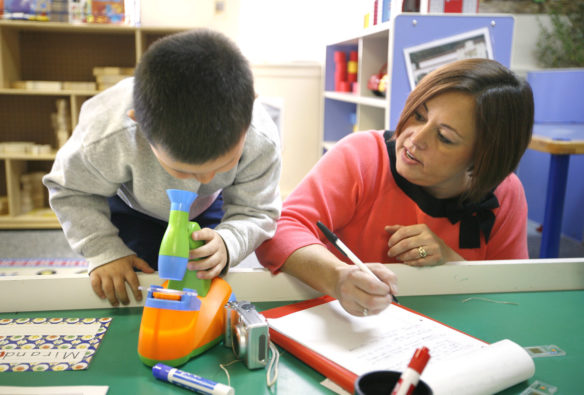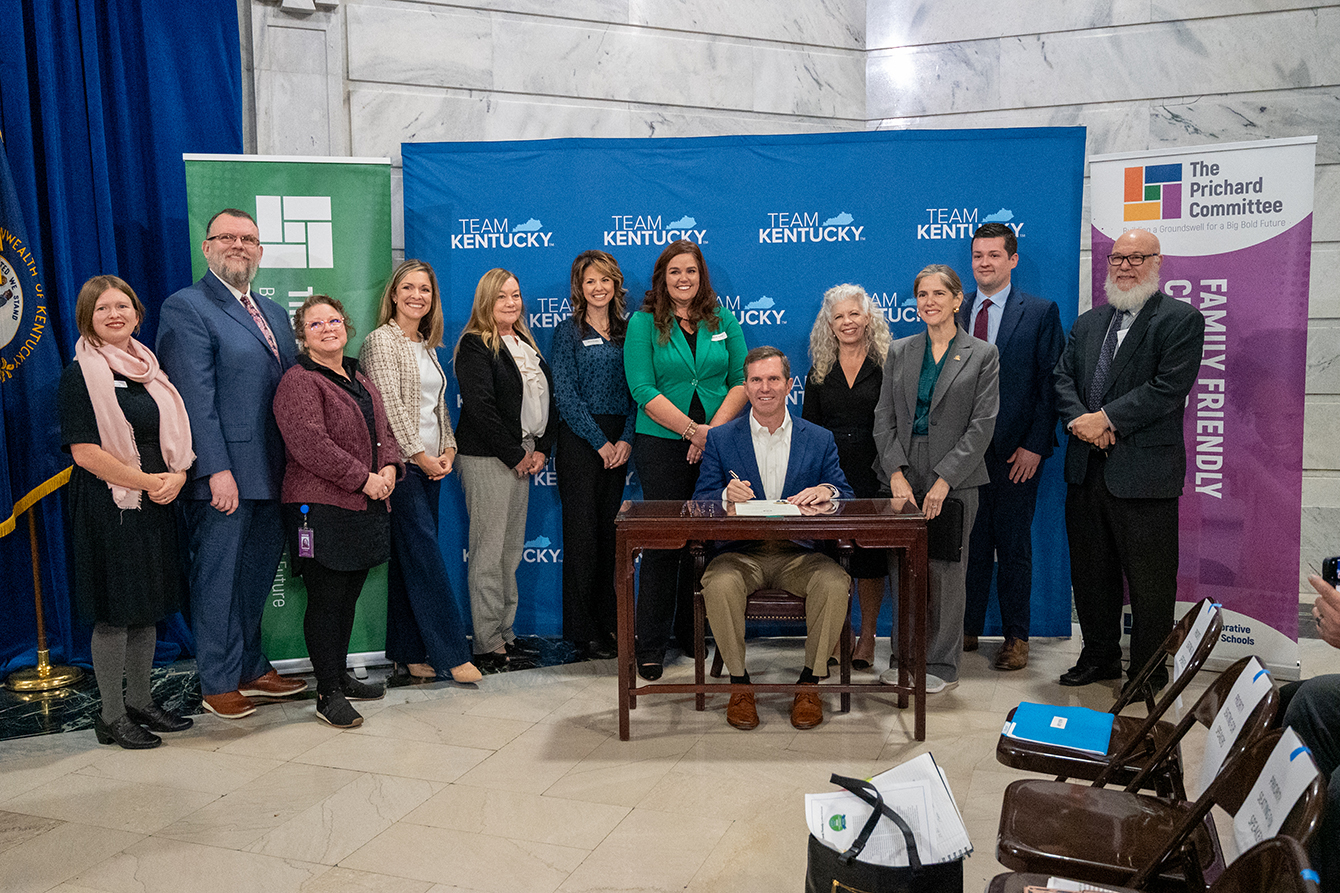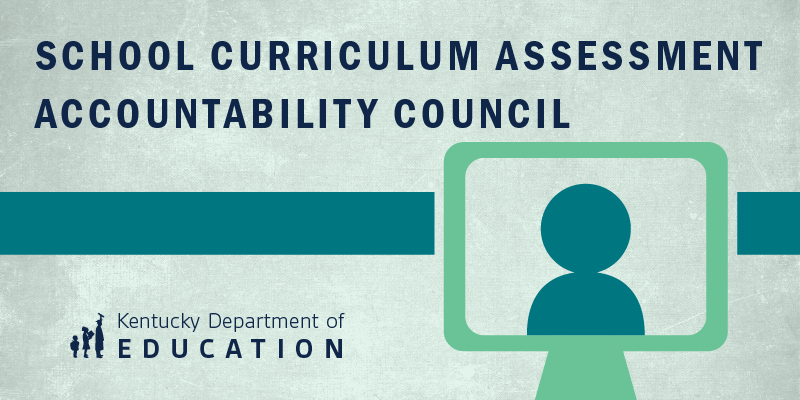
Jennifer Brock takes notes as Hunter Dixon looks at slides of insects during class at Sunshine School preschool (Harlan Ind.) Oct. 30, 2008.
Photo by Amy Wallot
- Almost 5,000 open positions have been listed on the Kentucky Educator Placement Service this year, and the number of college students pursuing education degrees declined by more than 13 percent over a five-year period.
- Kentucky Education Commissioner Wayne Lewis said students suffer when they do not have access to high-quality, effective teachers.
By Mike Marsee
mike.marsee@education.ky.gov
Teacher shortages are taking a toll on students throughout Kentucky, as critical shortage areas have been identified in a number of subjects and disciplines in all areas of the state.
Thousands of teaching positions in Kentucky schools remain unfilled as the start of a new school year approaches, and Kentucky Education Commissioner Wayne Lewis said that denies many students access to good teachers.
Since Jan. 1, almost 5,000 open positions have been listed on the Kentucky Educator Placement Service (KEPS), a free service of the Kentucky Department of Education (KDE) dedicated to helping job applicants and school districts fill certified vacancies.
However, there has been evidence of teacher shortages in Kentucky for several years. There were 6,247 open educator positions listed on KEPS in the 2014-2015 school year; that number increased to 8,855 for the 2016-2017 school year.
“If a school has been unable to identify a high-quality, effective teacher, that student is served by someone – usually a well-meaning, well-intentioned, loving adult – who has not been adequately prepared to teach what they are teaching. That’s not a good situation for kids,” Lewis said.
The Kentucky Department of Education (KDE) will be calling attention to teacher shortages and the need to fill them through Go Teach KY, a teacher recruitment initiative that will be launched in the coming months.
“This campaign is about recruiting and inspiring the next generation of teachers,” Lewis said.
Kentucky’s teacher shortages reflect a growing national trend. A 2019 report by the Economic Policy Institute said that while there was a surplus of teachers in the labor market in 2011-2012, the projected demand exceeded the estimated supply for the following year. The projected gap has grown sharply since then and is expected to continue to widen.
In Kentucky, shortages in the areas of exceptional children and early childhood education are most prevalent, based on a designation of teacher shortage areas by the U.S. Department of Education (USED).
In addition, the number of college students pursuing education degrees declined by more than 13 percent over a five-year period from 2013-2014 to 2017-2018, according to a report issued by the Council on Postsecondary Education.
“Make no mistake, teaching is one of the most important professions in our society and is absolutely critical to our future,” CPE President Aaron Thompson said. “The recent drop in bachelor’s degrees in education is telling us that we need to move forward with thoughtful and effective strategies. I look forward to working with our campuses, the Kentucky Department of Education and other education partners to strategically address this workforce shortage.”
That shortage will be addressed through Go Teach KY, which will focus on three avenues of teacher recruitment:
- The teaching and learning career pathway available to high school students, in conjunction with Educators Rising, a student organization for middle school and high school students interested in education-related careers;
- Active recruitment of college students and prospective college students into teacher education programs; and
- The eight options for alternative routes to teacher certification created by the Kentucky General Assembly for people who have demonstrated exceptional work and/or educational experiences.
Rob Akers, associate commissioner in KDE’s Office of Educator Licensure and Effectiveness, said spotlighting the alternative pathways to teaching is an important element of Go Teach KY.
“There is not enough awareness yet of these alternative pathways to teaching,” Akers said. “We believe that it’s important for us to lead in this work to support our districts in this effort to bring the best teachers possible to students of the Commonwealth.”
USED designates teacher shortage areas each year based on submissions by state education agencies. Teacher shortages in Kentucky are grouped within the state’s 10 local workforce development areas (LWDAs), and there were critical shortage areas in all 10 LWDAs during the 2018-2019 school year.
Shortages in the areas of early childhood education and exceptional children appear in more than half of the LWDAs, and shortages in career and technical education, English and communications, English as a second language, health and physical education, mathematics, science, social studies and world languages also appear in multiple LWDAs.
Here are the critical shortage areas in each LWDA:
- Bluegrass – early childhood education, English as a second language, foreign language, health and physical education, social studies, speech/language pathology
- Cumberlands – early childhood education, exceptional children
- Eastern Kentucky Concentrated Employment Program – career and technical education, early childhood education, English and communications, exceptional children, foreign language, mathematics, science
- Green River – exceptional children, science
- KentuckianaWorks – career and technical education, early childhood education, English as a second language, exceptional children, foreign language, mathematics, science
- Lincoln Trail – early childhood education
- Northern Kentucky – exceptional children, health and physical education
- Southeast/South Central – English as a second language, exceptional children
- Tenco – career and technical education, English and communications, exceptional children, science, social studies
- West Kentucky – career and technical education, early childhood education, English and communications, exceptional children, health and physical education, mathematics, science, social studies



Quit making it so hard to become a teacher! Imagine a $40,000 education is not enough to become a teacher! Nope you have to PASS a -pretest before beginning school! That’s a huge problem! If a person is going to spend $40,000 to learn how to teach, and then take a post test in their area of specialty, then why keep people from starting school due to failing a pre-test? It just makes no sense! Trust the $40,000 education or continue to see a shortage!
I wonder why?
Great initiatives for new teachers but what about incentives for teachers to stay in those positions ?
Bring back collective bargaining rights for teachers unions, ensure that our Pension system is solvent and protected, ensure every teacher across the state has a guaranteed and protected (compensation for meetings during this time) planning period of at least 50 minutes daily built into their schedule, reduce unfunded mandates, provide adequate curriculum and materials, ensure that no class size be more than 25, pay teachers competitively… need I go on?